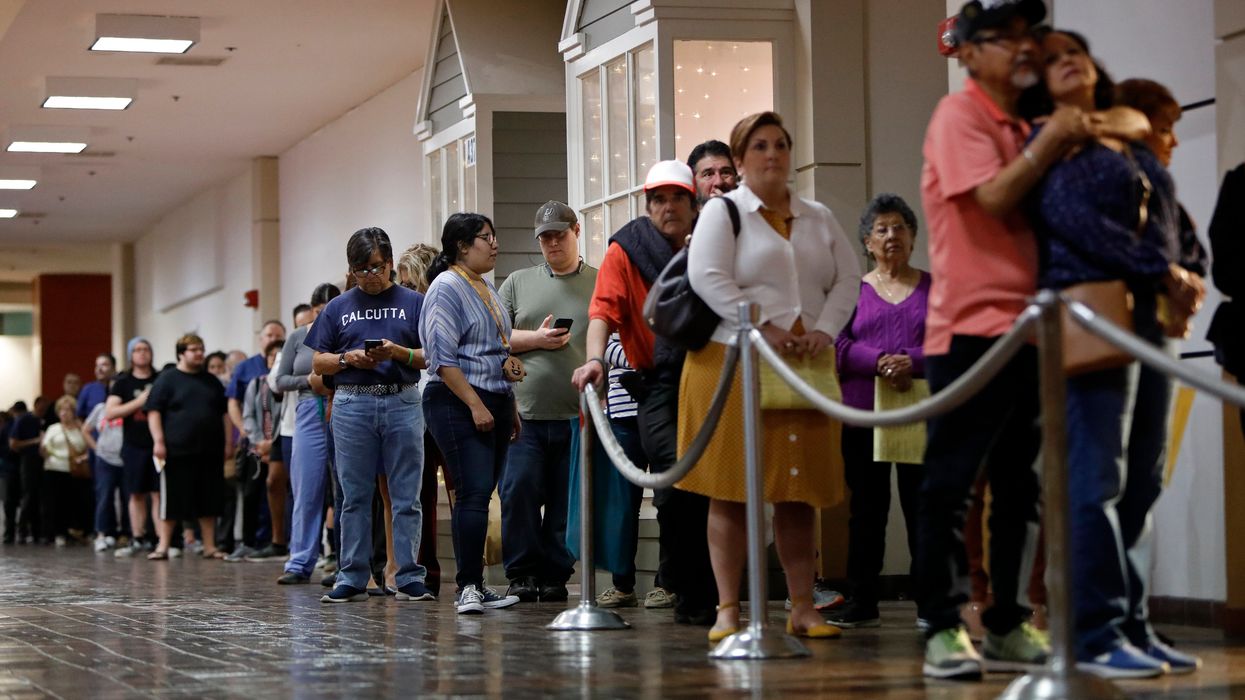The hours-long lines that confronted hundreds of thousands of Texans on Super Tuesday are sure to be even worse in November unless the state's new ban on straight-ticket voting is reversed, Democrats maintain in the fifth voting rights lawsuit they've filed in the state in recent months.
Permitting voters to make a single choice on the ballot, in favor of all the candidates of their political party, has been a feature of Texas elections for a century and was the way two-thirds of the state's voters, 5.6 million of them, cast ballots in the 2018 midterm. But the Republican Legislature has voted to eliminate that option starting this fall.
Doing so will "unjustifiably and discriminatorily burden Texans' fundamental right to vote" in an election where historic turnout is anticipated," the lawsuit argues. "Texas has recklessly created a recipe for disaster at the polls."
The second most populous state has been reliably red for the past quarter-century, but Republicans are aware that grip is loosening because rapid population growth is almost entirely in cities, white-collar suburbs, and Latino and African-American communities. Democrats believe that, if their turnout is enormous enough this fall, they have shots at securing Texas' 38 electoral votes, upsetting Senate Republican Whip John Cornyn's bid for re-election and picking up as many as six House seats.
Although Tuesday's turnout exceeded the 2016 Democratic primary, Texas historically has had some of the lowest voting participation rates in the country — just 51 percent four years ago, for example, when the national turnout was 60 percent.
And reversing that trend will be much less likely, Democrats say, if voters this fall are required to mark choices in several dozen partisan contests that will be on the ballots in some places — not just for president and Congress but also for state legislative, county government and judicial positions.
Democratic voters were picking nominees for all those jobs on Tuesday, not just making a presidential choice. That was one reason the lines moved slowly statewide. But a much bigger problem was the shortages of election workers and equipment, and problems with the voting systems, that created wait times as long as six hours to vote in all five of the state's biggest urban counties.
The new lawsuit, filed in federal court in Laredo, says that an end to straight-ticket voting would violate the Voting Rights Actand be an unconstitutional denial of free speech and equal protection rights to voters who will inevitably be dissuaded by such excessive wait times from casting ballots starting Nov. 3.
"We remain confident that Texas voting laws are in full compliance with the Constitution and all voters have equal opportunity to vote for the candidate of their choice," the Texas attorney general's office, led by Republican Ken Paxton, said in response.
The Democrats' legal claim is a novel approach to preserving an election option that's been fading steadily in recent years. Just seven states are sure to have straight-ticket voting this year: Alabama, Indiana, Michigan, Kentucky, Oklahoma, South Carolina and Utah. Six have done away with the practice in the past decade, most recently Pennsylvania last fall.
Republicans have led the criticism of the system. They say it makes the electorate less engaged, punishes lesser-known candidates and gives too much power to partisan organizers. Democrats and most good-government groups disagree and point to research showing straight-party voting boosts turnout.
The plaintiffs in the new suit — the state Democratic Party and the national House and Senate Democratic campaign committees — have also sued Texas in the past year for ending the use of mobile voting sites for early voting, prohibiting electronic signatures on registration forms, complicating the process for registering while getting a driver's license and requiring that the political party of the governor (always a Republican since 1995) be listed first on all ballots.
It's the most aggressive vein of the Democrats' expansive courthouse campaign to make it easier to vote in bellwether states this fall. The party has committed more than $10 million to pressing more than two-dozen suits, promoting the Republican Party to promise it will spend comparablyto defend the voting laws at issue.
"Texas is the center of our battlefield and we will not stop taking on the obstacles Republicans put in place to shrink the electorate as they attempt to cling to power," said Rep. Cheri Bustos of Illinois, the chairwoman of the Democratic Congressional Campaign Committee.
"I wish I could say that the hard work is done in fighting voter suppression for 2020. However, in many ways, the fight has just begun," said the attorney coordinating the party's effort, Marc Elias. "State legislatures are considering new voting laws that will suppress the vote. And, in many states, election officials are implementing other creative ways to block people from voting."
Attorneys from the Texas Civil Rights Project, meanwhile, pressed the state Thursday to spend generously in the next seven months to assure there are more machines in Houston, Dallas, Fort Worth, San Antonio and Austin and that the voters there are encouraged by the state to cast ballots in the fall.




















Marco Rubio is the only adult left in the room